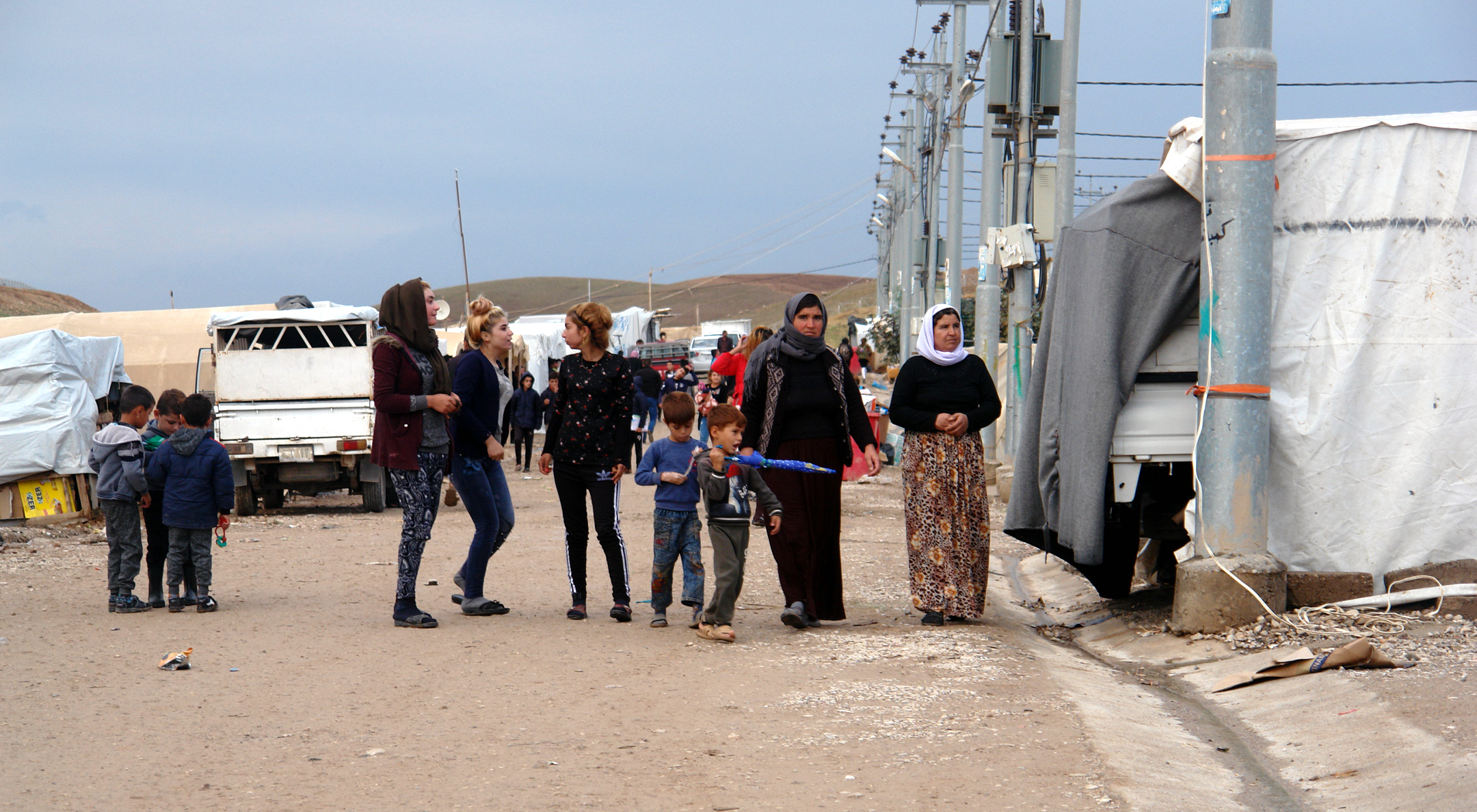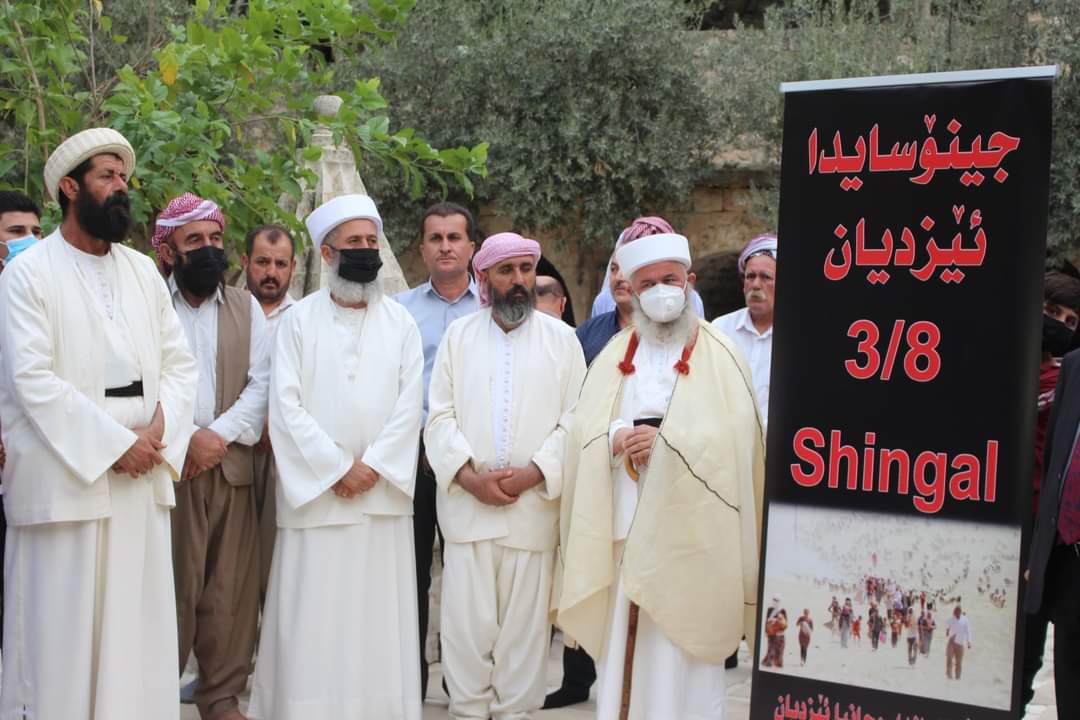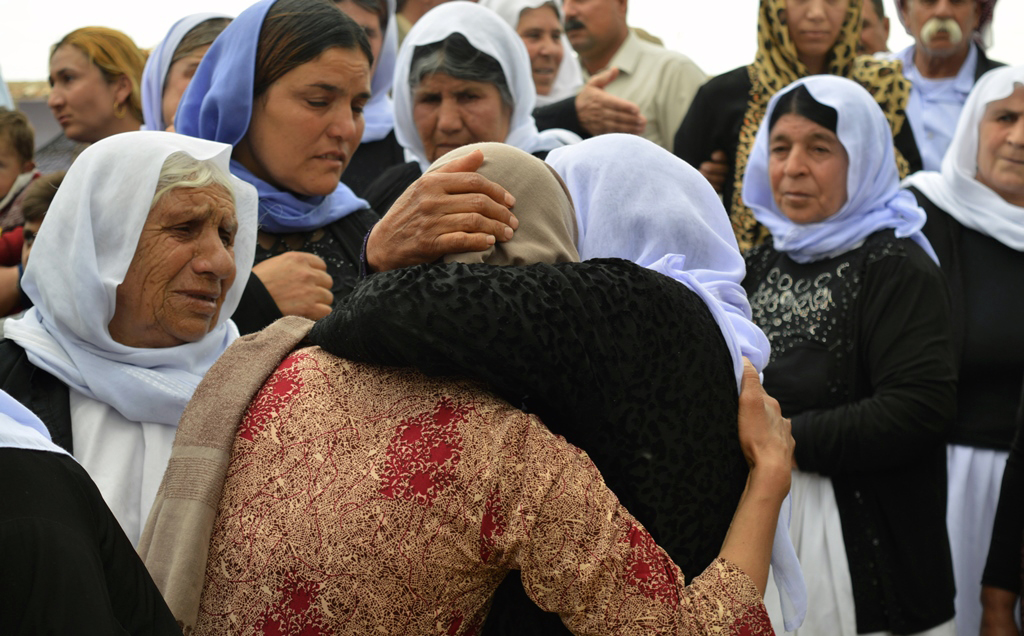The sole dream of Ahlam Mia to make it back home is to receive her rights stated in the law for moral and material reparation for Ezidi women survives slavery by the extremist militants of so-called Islamic State in Iraq and Syria ISIS.
A year ago, she was obliged to migrate to Germany as she had no resource to lead an ordinary livelihood following years of slavery by IS militants whom accuse the pacifist war-torn Ezidi community of being devil worshippers and heretics.
“If they implement the law, I am entitled to receive a monthly salary, a plot of land for residence, then I am ready to go back to my home town with my kids,” said, Mia, a 33-year-old resident of Gir Zarga of Shingal district, home to hundreds of thousands of adherents of Ezidism.
Mia was rescued by a ransom of USD20,000 via a mediator on 2018 as she was in the town of Der al-Zour in Syria.
“I have spent four years full of misery and pain at the hands of Daesh. When I was rescued, I had no job or any income so I headed to Germany,” the sobbing mother told KirkukNow.
When I was rescued, I had no job or any income so I headed to Germany
Ezidis are an ethno-religious minority, mostly residing in Shingal and Shekhan, in northern Iraqi province of Nineveh. The militants of Daesh extremist group in 2014 attacked their communities, killing thousands of men and taking thousands of women and children, in an atrocity the U.N. said amounted to genocide.
IS reportedly used the women and girls as sex slaves. Tens of thousands of Ezidis are still living in Internally Displaced Person IDP camps in Iraqi northern province of Duhok.
In March, the Iraqi parliament endorsed a law for reparation of Ezidi women survivors of ISIS which provides moral and material compensation, support and rehabilitation for the community, particularly the female members who escaped Islamic State abduction and slavery.
Only one step is taken on the ground when up to now while 90-days is left to register the cases.
Baghdad government has decided mid-July to initiate a new directorate for the affairs of Ezidi and other minority women survivors of ISIS captivity with office in Shingal and an Ezidi woman appointed as director.
Mia and many Ezidi survivors impatiently await execution of the law and furious of the slow path of practicing the law. They have shared their concerns with key figures of their community.
“They only talk and no action seen. We were thrilled by the law but now we are doubtful it will be practiced,” Mia said.

The camp of Mam Rahsan for Ezidi IDPs in Duhok northern province in 2019. KirkukNow
The bill provides Ezidi and other minority women who survived the IS massacre with financial support, health care, work opportunities, education, rehabilitation, and reconstruction in their villages and towns. With the establishment of a special governmental department for Ezidi affairs, the bill represents the first recognition in Iraqi history of the minority as a distinct group.
Willing survivors can resume their education overlooking age and degrees. They have the priority of employment by the state once job opportunities available. Psychotherapy is another healthcare to be freely provided to the survivors who are still traumatized of what happened to their families in August 2014 and what they suffered as sex slaves at the hands of IS militants.
“My kids were admitted to school again because of their age, a matter addressed in the law in the interest of many people once it is applied,” Mia optimistically says.
The law covers Turkmen, Christian and Shabak women and men survivors of IS.
“Implementation of the law will need to be focused comprehensively supporting & sustainably reintegrating survivors,” said Nadia Murad, Nobel Peace Prize Laureate and advocate for survivors of sexual violence.
“We pledge moral & material support to the victims & their relatives with support of security services,” said the Kurdistan Regional Government KRG’s Office for Rescue of Abducted Ezidis' statement on August 2nd.
The office updated figures show that out of 6,417 abducted Ezidis, up today 3,550 have been rescued from IS, 2005 of them were children, and 1,206 women.

Ninawa, Feb. 6th 2021- The ceremony for burial of 104 Ezidis found in a mass grave in the village of Kojo in Shingal. KirkukNow
MPs of the Ezidi community in Baghdad are conveying the furiousness of the war-torn community to senior officials.
“The process of execution of the law are sluggish and only one person was nominated as director general so we expressed our concerns to relevant authorities,” said Hussein Hasan Narmo, an Ezidi member of the Iraqi parliament.
“The government is not cooperating. It’s full of routines. Even president of Iraq is unpleased and promised keen follow up for the slow process and to accelerate it,” Narmo added.
“There are serious efforts and seven billion Iraqi Dinars has been allocated to reparate all the survivors.”
The Iraqi law is to commemorate ISIS atrocities against the Eizidis on August 3rd.
The Ezidi community hopes the Iraqi government can bring home the missing people and to retrieve the bodies of the dead and give them a proper burial.
Last week, a group of Ezidi community figures and activists handed over a letter to the United Nations and the Iraqi government including several demands, one of it urges for speed up in compensation of Ezidi women survivors.
“The survivors have not received none of their rights by the Iraqi government after seven years so there is no excuse not to compensate them, our letter to UN says,” Darwesh Chuki Jardo, director of Tulay NGO for the survivors, told KirkukNow.
“It’s the duty of the Iraqi government to practice the law on the ground.”

Shekhan, August 2nd 2021- The anniversary of Daesh take over of Shingal in Lalish temple. Photo credit of the Ezidi Spiritual Council
The office of the Ezidi Amir, the highest rank in the Ezidi community, supports the Ezidi women survivors in their demands.
“Now it’s time for the Iraqi government to undertake the law endorsed by the parliament. There is no excuse to delay it and it’s the right of the survivors to get all those privileges,” said Jawhar Ali Beg, assistant of the Ezidi Amir for public relations.
Ali Beg said in all their meetings with Iraqi and foreign delegations, they emphasized the need to implement that law. “Mir of the Eizids also is putting an ongoing effort with the executive powers into practicing the law.”
Now it’s time for the Iraqi government to undertake the law
The victims eligible to benefit from the law must approach a committee composed of members from the ministries of justice and interior, the Kurdistan Regional Government KRG, and headed by a judge from the Supreme Judicial Council.
According to KRG office figures, out of 550,000 Ezidis, 360,000 were displaced, 160,000 back to Shingal, and 100,000 migrated abroad.
In the first few days of Daesh take over of the Eizid region, 1,293 Ezidis were slaughtered yet only bodies of 104 were found as most of them were buried in 82 mass and individual graves.
2,763 were brought to unknow destiny and 68 temples were destructed.
Shingal, located 120 west of Mosul, on the border of Iraq-Syria, is home to the Ezidi minority targeted by Islamic State (IS) group in August 2014 and taken over by Iraqi forces on October 13th, 2015. It’s one of the disputed territories between Baghdad and Erbil.
Mia and many Ezidi survivors impatiently await execution of the law and furious of the slow path of practicing the law. They have shared their concerns with key figures of their community.
“They only talk and no action seen. We were thrilled by the law but now we are doubtful it will be practiced,” Mia said.





